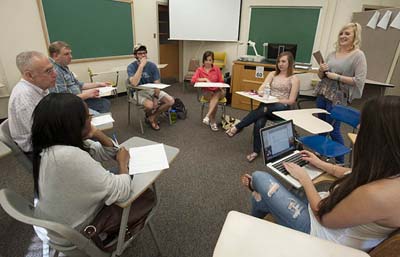Interviews for the Strategic Visioning Project are in full swing. Weigh in on the future of IUP: Sign up for one of the project team's informal group interviews on April 25, May 2, and May 9.

Four participants (left) were interviewed by journalism student and group facilitator Hannah McCracken (standing) and three other members of the Strategic Visioning Project team on Thursday, April 18.
Talking about IUP
About 175 members of the university and Indiana communities have been interviewed for the Strategic Visioning Project since President Michael Driscoll announced his innovative plan to have 29 journalism students, led by Professor Michele Papakie as part of her Public Relations and Presentation Making class, execute this project important to the future of the university.
Students, faculty, staff, alumni, and Indiana community members, including business owners and legislators, have been interviewed by the student team.
Groups of a few people to almost 30 people at a time have shared their views of IUP's strengths, weaknesses, opportunities, and threats and what is most distinctive about IUP.
The team has compiled about 40 typed pages of comments and will continue to interview as many people as they can throughout the Indiana and campus communities until sometime in August. They'll enter the data into qualitative analysis software in the summer to identify trends university leaders can explore as they prepare for Middle States reaccreditation and determine strategic planning initiatives.
Interviews have been held both on campus, at meetings of the Career Advisory Board and IUP Ambassadors and other organizations, and off campus, at alumni events in Pittsburgh.
The student team headquarters is Room 418, Davis Hall, and interviews are also held there on Thursdays from 5:00 to 6:20 p.m. Three more sessions are scheduled for April 25, May 2, and May 9. Everyone is encouraged to sign up and participate.
"Thrown to the Lions" and Liking It: The Student Team Experience
Many of the students on the project team are sharing their thoughts on this exceptional real-impact learning opportunity on a project Facebook page, on Twitter, and on a blog called Reflections.
A number of them say the challenge was intimidating at first. After all, the work requires them to facilitate discussions among strangers, give public presentations in front of groups of people, and learn more new skills—all with the understanding that their work will have a bearing on the future of the university.
Anthony Hall "was a little uneasy," and Shawna McCutcheon says she was "being shoved out of my comfort zone." Caleb Murphy, who as a teenager battled such intense shyness that he stopped talking for years, says he's "thrown himself to the lions" in leading these group interviews.
But two months on, and many of the students are seeing themselves differently as they gain a framework for and experience in facilitating a sizable public relations project.
“I showed them how our course objectives could be met through these real-world experiences,” says Papakie, “rather than giving five or six speeches in the classroom to their peers.”
“Never did I expect such a huge opportunity," says McCutcheon, a nontraditional student. "The learning process alone is worth its weight in gold, plus it'll look great on my resume."
Although Papakie has given the students the option to return to more traditional course work only, no one has taken her up on it yet.
"They're growing and learning," she says, "well beyond what they'd originally expected from the class.”
—Deborah Klenotic